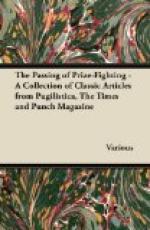2. Explain the philosophical meaning of the sentence—“He cut away from the crushers as quick as a flash of lightning through a gooseberry-bush.”
3. There are two kinds of electricity, positive and negative; and these have a pugnacious tendency. A, a student, goes up to the College positive he shall pass; B, an examiner, thinks his abilities negative, and flummuxes him accordingly. A afterwards meets B alone, in a retired spot, where there is no policeman, and, to use his own expression, “takes out the change” upon B. In this case, which receives the greatest shock—A’s “grinder,” at hearing his pupil was plucked, or B for doing it?
4. The more crowded an assembly is, the greater quantity of carbonic acid is evolved by its component members. State, upon actual experience, the per centage of this gas in the atmosphere of the following places:—The Concerts d’Ete, the Swan in Hungerford Market, the pit of the Adelphi, Hunt’s Billiard Rooms, and the Colosseum during the period of its balls.
[Illustration]
ANIMAL ECONOMY.
1. Mention the most liberal pawnbrokers in the neighbourhood of Guy’s and Bartholomew’s; and state under what head of diseases you class the spring outbreak of dissecting cases and tooth-drawing instruments in their windows.
2. Mention the cheapest tailors in the metropolis, and especially name those who charge you three pounds for dress coats ("best Saxony, any other colour than blue or black"), and write down five in the bills to send to your governor. Describe the anatomical difference between a peacoat, a spencer, and a Taglioni, and also state who gave the best “prish” for old ones.
* * * * *
HARVEST PROSPECTS.
Public attention being at this particular season anxiously directed to the prospects of the approaching harvest, we are enabled to lay before our readers some authentic information on the subject. Notwithstanding the fears which the late unfavourable weather induced, we have ascertained that reaping is proceeding vigorously at all the barbers’ establishments in the kingdom. Several extensive chins were cut on Saturday last, and the returns proved most abundant.
Sugar-barley is a comparative failure; but that description of oats, called wild oats, promises well in the neighbourhood of Oxford. Turn-ups have had a favourable season at the ecarte tables of several dowagers in the West-end district. Beans are looking poorly—particularly the have-beens—whom we meet with seedy frocks and napless hats, gliding about late in the evenings. Clover, we are informed by some luxurious old codgers, who are living in the midst of it, was never in better condition. The best description of hops, it is thought, will fetch high prices in the Haymarket. The vegetation of wheat has been considerably retarded by the cold weather. Sportsmen, however, began to shoot vigorously on the 12th of this month.




